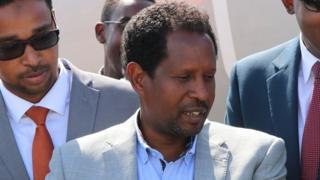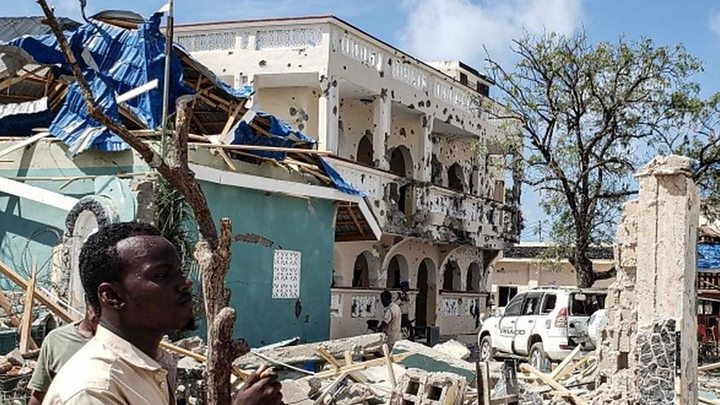My friend, the mayor of Mogadishu
It was late afternoon in Mogadishu, a few years back, and a bleary-eyed man in a dishevelled uniform was blocking my way – and brandishing a grenade.
It seemed an odd choice of weapon. But that was hardly the point.
I reached, slowly, for my phone, and called a friend for help.
I knew Engineer Yarisow would answer. He always did. And I knew he would sort things out – that was his speciality.
At the time Engineer Yarisow was Somalia’s presidential spokesman. But over the years he’s held many important posts: government adviser, cabinet minister, and mayor of Mogadishu.
A charming, brave, dedicated, and ridiculously modest man, with a grin usually lurking beneath his hesitant moustache.
If his name – Engineer Yarisow – stands out, it’s because it’s a nickname. And Somalis take their nicknames seriously. Yarisow means small; engineer refers to the fact that Abdirahman Omar Osman once trained to be an engineer. Hence, Engineer Yarisow.
He lived for decades in London after fleeing Somalia’s civil war. He was a local councillor in Ealing and a housing official, a pillar of the community – a British family man, as well as a Somali.
But then, in 2009, he went back to Mogadishu. Alone.
No-one sent him. No-one pushed him. He did it because it was the right thing – the courageous thing.
And yes, he told the man with the grenade to leave me be – and it worked.
Over the years I’ve met so many members of Somalia’s far-flung diaspora, who, like Engineer Yarisow, have left families, careers, and security behind to return to help rebuild their native country.
All of them knowing the risks – knowing how dangerous Somalia still is.
Some have opened restaurants, or businesses, or hospitals.
Some, like the journalist Hodan Nalayeh, came back from Canada to try to show the world a different side of Somalia – its beaches, its culture, its food.
Hodan was one of the most energetic, most enthusiastic people I’ve ever met. Two weeks ago, she was killed by al-Shabab, when the Islamist militants attacked a hotel in the south of the country.
Then, last week, came the news I’d been half-expecting and dreading for years.
A suicide attack on the mayor’s office in Mogadishu. Six dead. Engineer Yarisow was among the wounded. I rang some friends to find out more.
It was bad – the mayor was in a critical condition, his skull damaged. Later he was flown abroad, to Qatar, for surgery.
One of the people I called was Hodan Ali, who’d left the building not long before the bomb went off.
She’s another Canadian Somali, from Ontario, a doctor and mother of three. Three years ago, she left her young family behind and flew to Mogadishu – a necessary sacrifice, she calls it.
She’s now an adviser in the mayor’s office, focusing on the humanitarian needs of the city’s poorest.
“Since the attack, my family in Canada text me every day,” she told me. The message is always the same: one word – “leave”.
But she won’t.
“We can’t,” she said. “That would leave a vacuum for the extremists to fill.”
She’s been left feeling numb, wondering who she can possibly trust any more. The bomb was detonated, it’s thought, by a blind woman who’d been working in the office next to Hodan’s.
I didn’t mention the words screamed last month by a crowd of Trump supporters in the US, the words aimed at another Somali immigrant – a congresswoman. The words: “Send her back.”
But I didn’t need to mention them. They still hang in the air.
“Back in Ontario,” Hodan said, “People always ask me where I come from. My kids get asked the same question, all the time. At least here, no-one asks that. It’s about finding your own space in this world, where you don’t have to justify your existence.”
We talked about Engineer Yarisow – about how he was one of those rare politicians who actually got things done, who knew how to navigate Somalia’s poisonous factionalism.
And then, a few hours later, I got a short text message from someone else in Mogadishu: “He’s gone.”
Engineer Yarisow died of his injuries on Thursday.
He was a relentlessly optimistic man. Any chance he got, he would talk about Mogadishu’s glory years in the 60s and 70s, before the civil war. It was, he’d say, a jewel of a city on Africa’s Riviera. It would be so again one day.
The last time I saw him was, I think, on the terrace of a new restaurant on Mogadishu’s Lido beach at sunset. In front of us, crowds of young Somalis, many back from the diaspora for the holidays, playing in the waves – a riot of accents from all over the world.
And Engineer Yarisow sitting at a long table, tucking into a fresh lobster, enjoying the view. A hopeful smile on his face.
Source: Read Full Article





